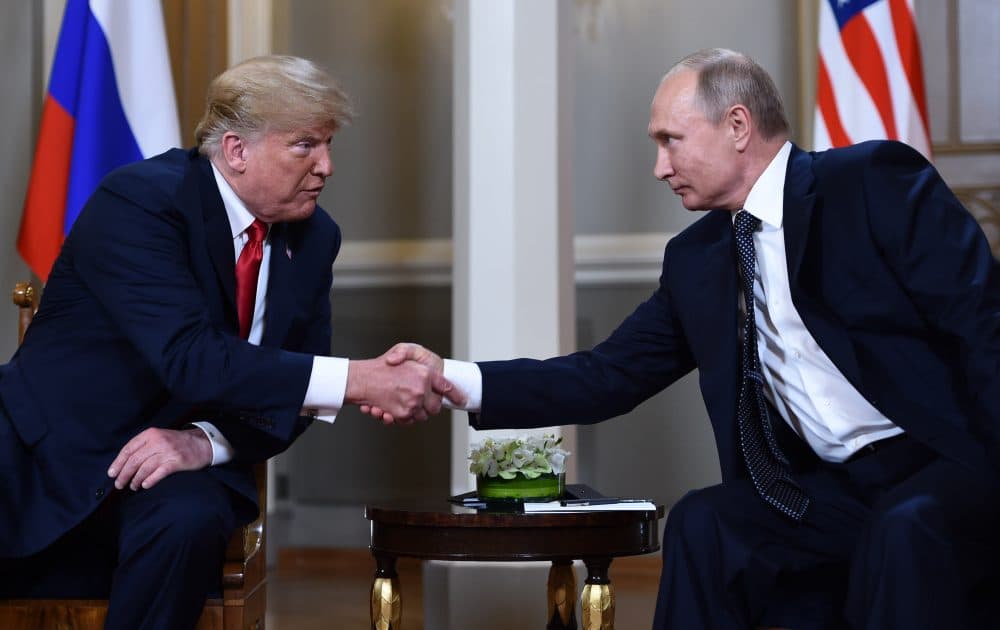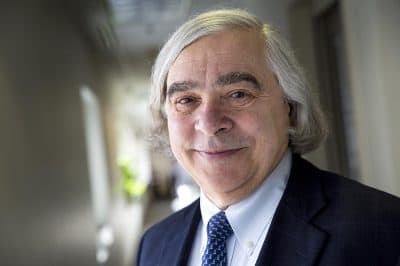Advertisement
Former Energy Secretary On Trump's 'Unsettling' Summit And Nuclear Dialogue With Russia
Resume
Russian President Vladimir Putin called his first summit with President Trump a success, but warned Thursday that Trump's opponents in the U.S. are hampering any progress on what they discussed, such as limiting their nuclear arsenals.
Here & Now's Jeremy Hobson speaks with former Energy Secretary Ernest Moniz (@ErnestMoniz), co-chair of the Nuclear Threat Initiative, about the Trump-Putin summit and what it could mean for nuclear dialogue.
“The performance in Helsinki was, of course, very unsettling, shall we say, at a minimum. In particular, the idea that the president would elevate Putin in reliability above our intelligence agencies was simply unconscionable,” he says. “Still, we are hoping, especially on the issue of nuclear weapons and nuclear proliferation, something can come out of this.”
Interview Highlights
On the New START treaty between Russia and the U.S.
“The New START treaty does put a cap on strategic weapons, but very importantly, it also provides transparency and confidence-building measures. And in fact, if we allow that treaty to lapse in 2021, it would be the first time in a long long time that Russia and the United States, or Soviet Union and the United States, have not had such transparency measures.”
On if the U.S. and Russia will extend New START before it expires in 2021
“Well first of all, we certainly should. And the issues that President Putin is referring to is Russia has questions about whether certain conversions of delivery systems are or are not nuclear capable. And by the way, there are issues as well on what's called the [Intermediate-Range] Nuclear Forces Treaty, in which both sides accused the other of noncompliance. In reality, these are exactly the kinds of questions where what we need to do is have very professional military-to-military collaborations, inspections, etc., to clear the air. And if one side is in fact not in compliance — and frankly we are very sure that Russia is not in compliance with the intermediate forces treaty — then we find solutions to that.”
"We feel that the potential for a blunder basically is higher now than it's been in a very long time. I would say [since] the Cuban missile crisis."
Ernest Moniz
On Trump’s argument that it’s better to have a good relationship with Russia
“Well, I wouldn't use the term 'good relationship.' I don't see how we can have a good relationship in a certain sense across the board without resolving Ukraine, Crimea, Syria, election meddling and the like. But we need a professional relationship in pursuing our mutual aims in terms of risks, and nuclear is No. 1 in that context. … These two countries — Russia, the United States — we have more than 90 percent of the nuclear weapons, and we feel that the potential for a blunder basically is higher now than it's been in a very long time. I would say [since] the Cuban missile crisis. I want to emphasize this is not like a reward to Russia as it is often portrayed. This is a hard-nosed discussion based upon mutual interests and preventing what is really the only existential threat that the United States and Russia have [which] is nuclear weapons used by the other side.”

On the likelihood of resolving nuclear issues in North Korea
“I think the administration has not yet laid out what its real objectives are other than this simple word ‘denuclearization,’ which by the way that word itself is somewhat ambiguous. … It could mean reducing. It doesn't mean eliminating civilian nuclear power, for example. This administration keeps saying they want all nuclear weapons and materials and facilities removed within 20 months. I just don't think that's reasonable, so we need a rational strategy. We also need to have a much more active dialogue with other parties — South Korea, obviously, but China, Japan, Russia — than at least we see evidence of publicly. There is no security solution to the Korean Peninsula without having all of those parties engaged, so this is a hard negotiation. As you know, I was involved in the Iran negotiation. North Korea is certainly not simpler than the Iran situation. So I think there's really tough, hard diplomacy based upon a realistic roadmap that we need to pursue.”
On the U.S. withdrawing from the Iran nuclear deal
“First of all, I do want to emphasize the deal is still in place in the sense that the Europeans, Russia, China and Iran [are still in compliance]. ... The United States is in violation of the agreement, bluntly. And what's especially important … is that at the heart of the Iran agreement are the most stringent, unique verification measures that any country operates under. That is what ultimately is the grounding of continued confidence that Iran has not resumed nuclear weapons activity. So that's the key: Will that verification regime be preserved or not?”
"In the ‘80s, we had all kinds of problems with the Soviet Union, proxy wars all over the place, and yet that did not prevent a focus on the existential threat of nuclear weapons and summitry there."
Ernest Moniz
On if withdrawing from the Iran deal had an impact on North Korea
“No. I do think, however, that the Iran deal — whether the United States is in it or not — frankly has set a standard on verification measures and that will be a very difficult, hard road to follow with North Korea given the closed society, etc., No. 1. No. 2: Given the fact that unlike Iran, North Korea does have nuclear weapons, and as is well known, we really don't know how many they have. So how are we going to be assured that even if there's an agreement going forward that they have in fact declared all of their nuclear weapons? At some point, we're going to need a very intrusive verification regime that will not be easily achieved. Iran sets the standard today.”
On Trump’s criticism that the Iran deal is the “worst deal ever”
“It's a statement without substance whatsoever. I think what you might interpret this to mean is that the complaints are far less with what the deal is — frankly I see none of real substance — it's about what the deal is not. It doesn't address Hezbollah. It doesn't address Yemen and Syria and the like. And of course, we took the same, President Obama, took the same approach as I would argue, President Reagan took. In the ‘80s, we had all kinds of problems with the Soviet Union, proxy wars all over the place, and yet that did not prevent a focus on the existential threat of nuclear weapons and summitry there. So here again, it was the same thing, that focus on the existential issue, and of course, keep addressing the other issues.”
This segment aired on July 19, 2018.